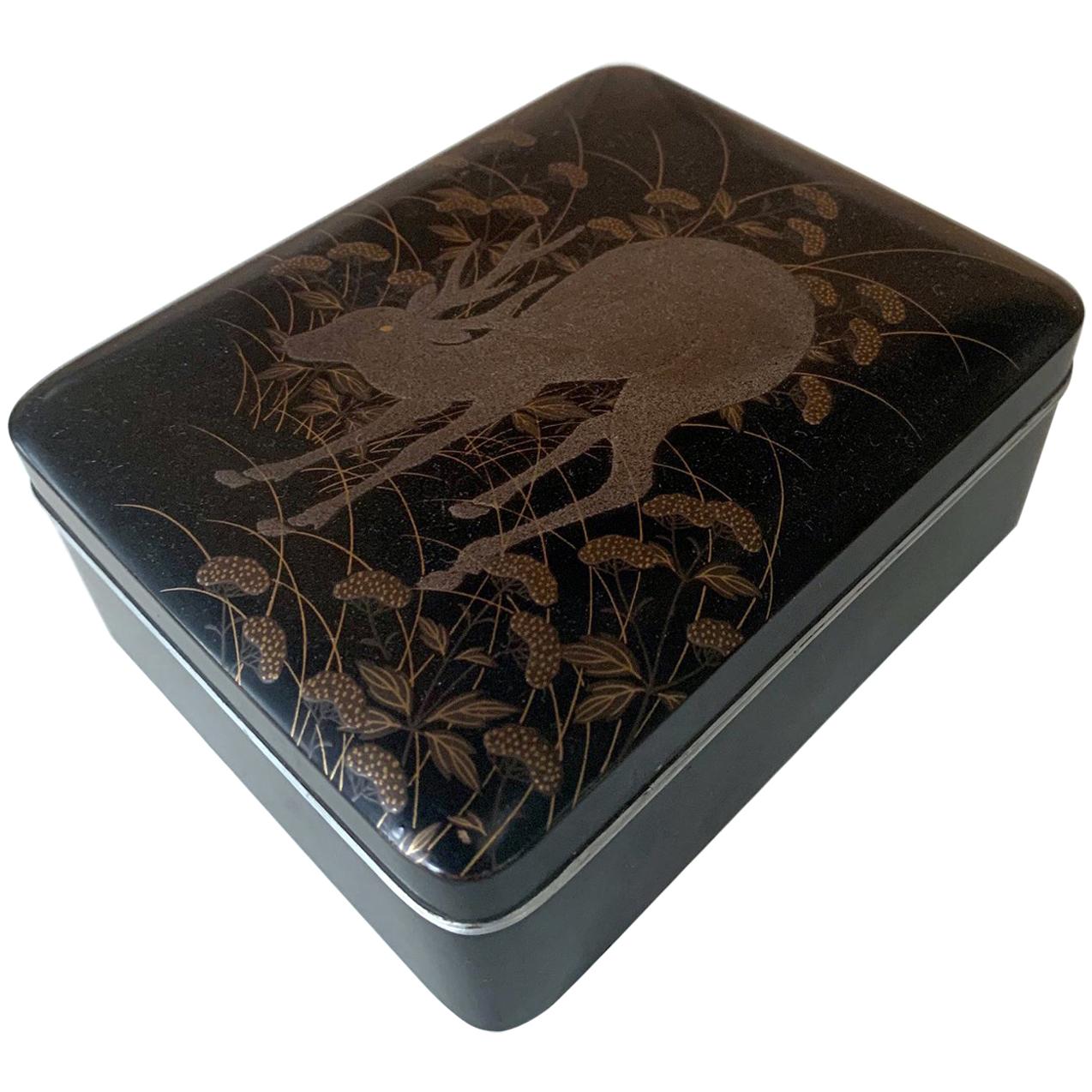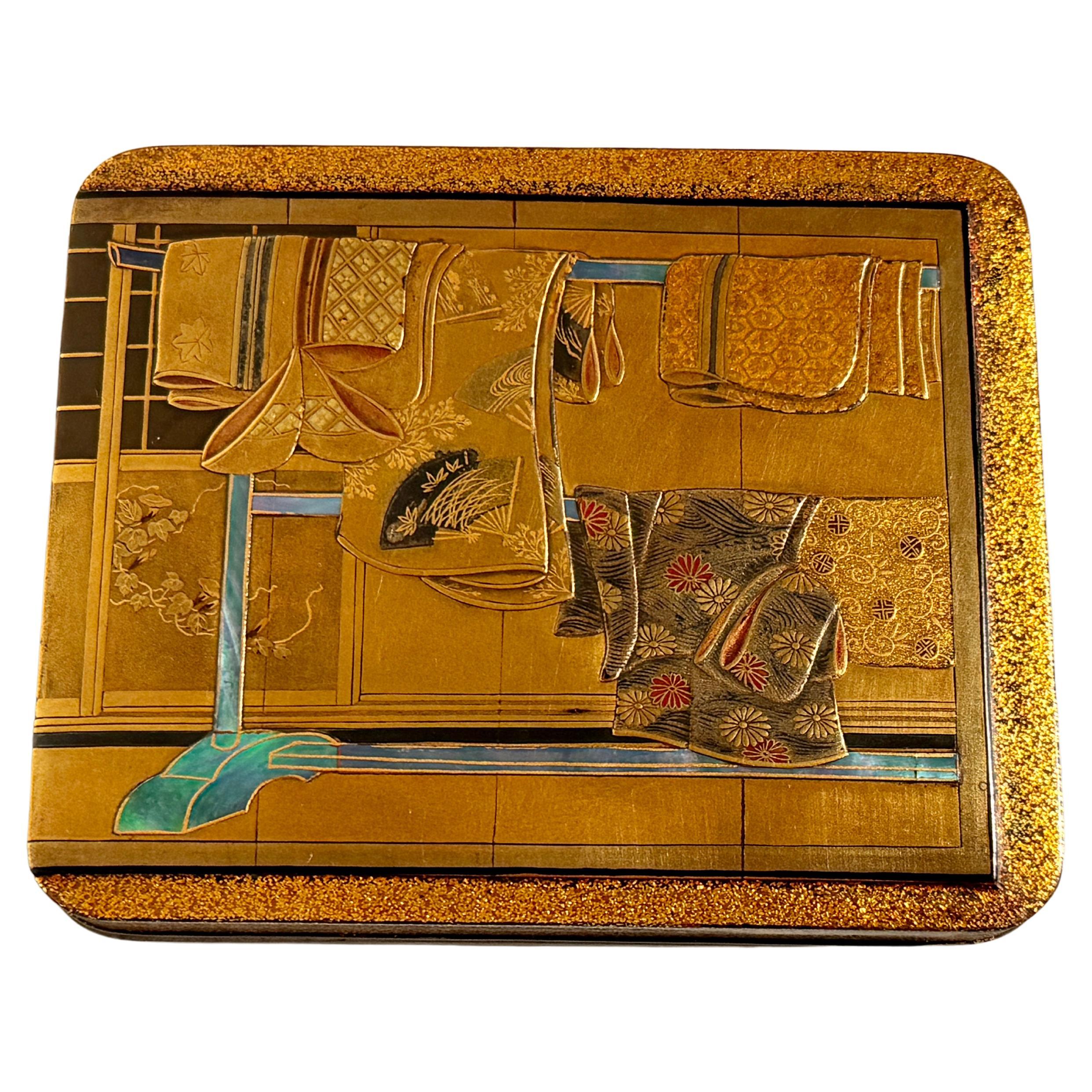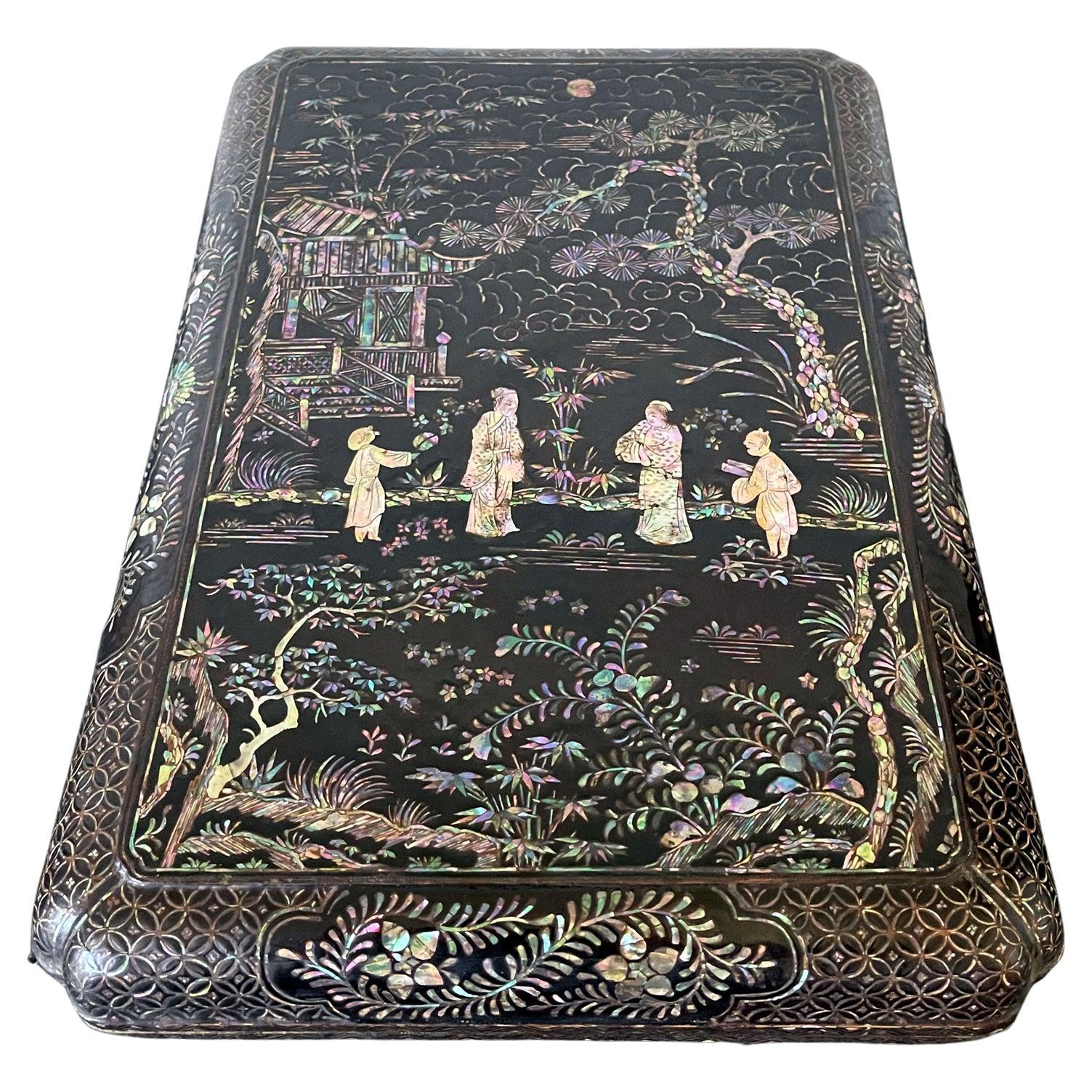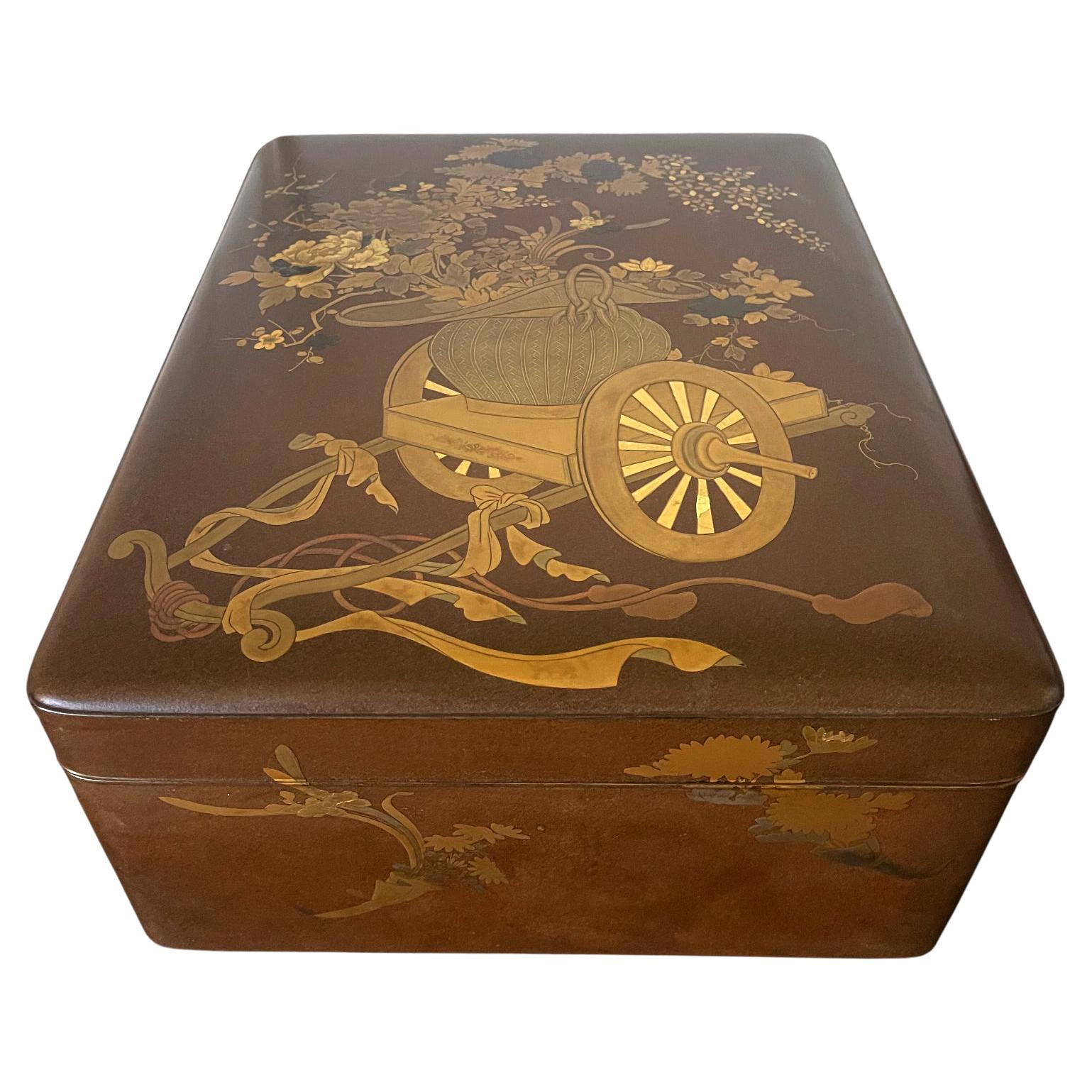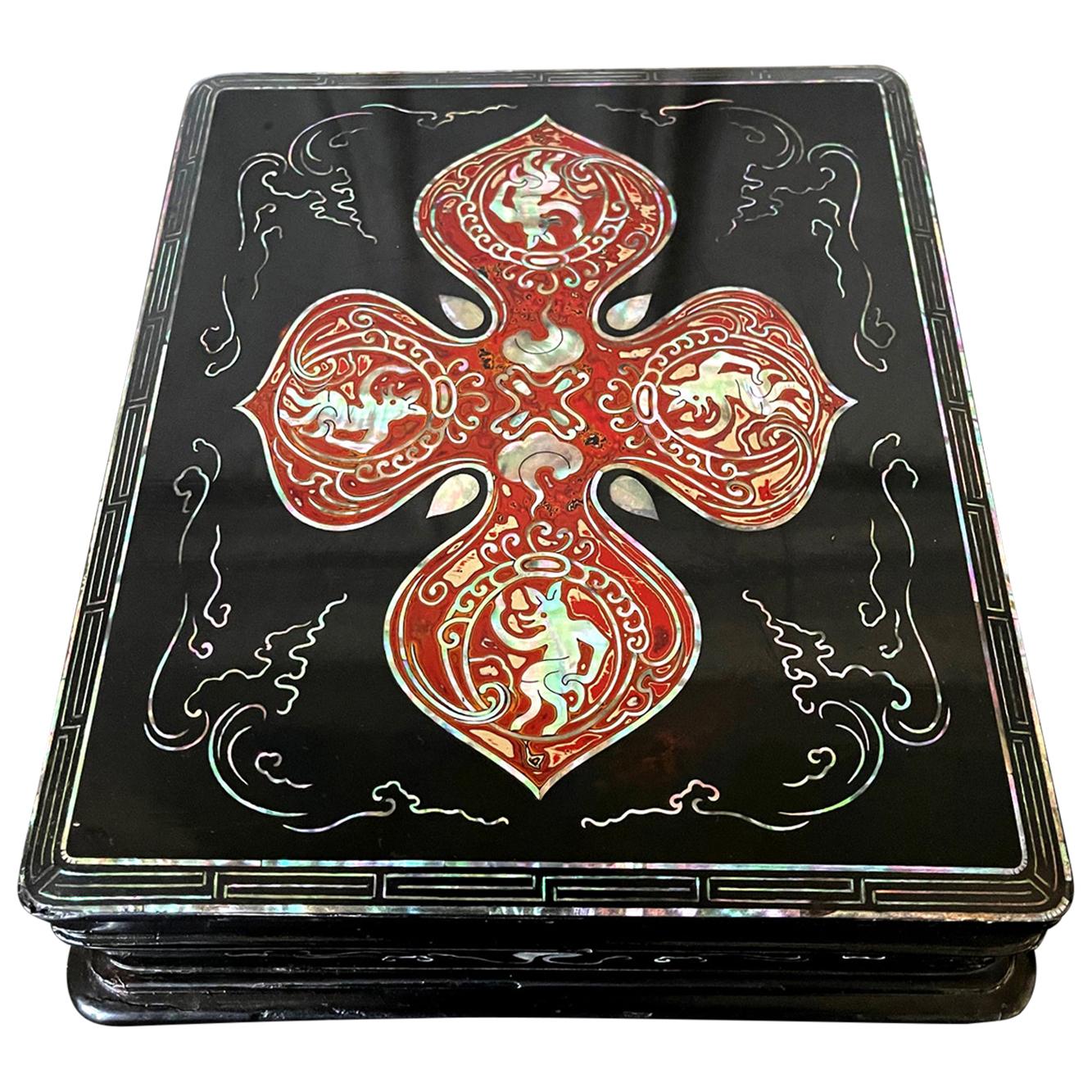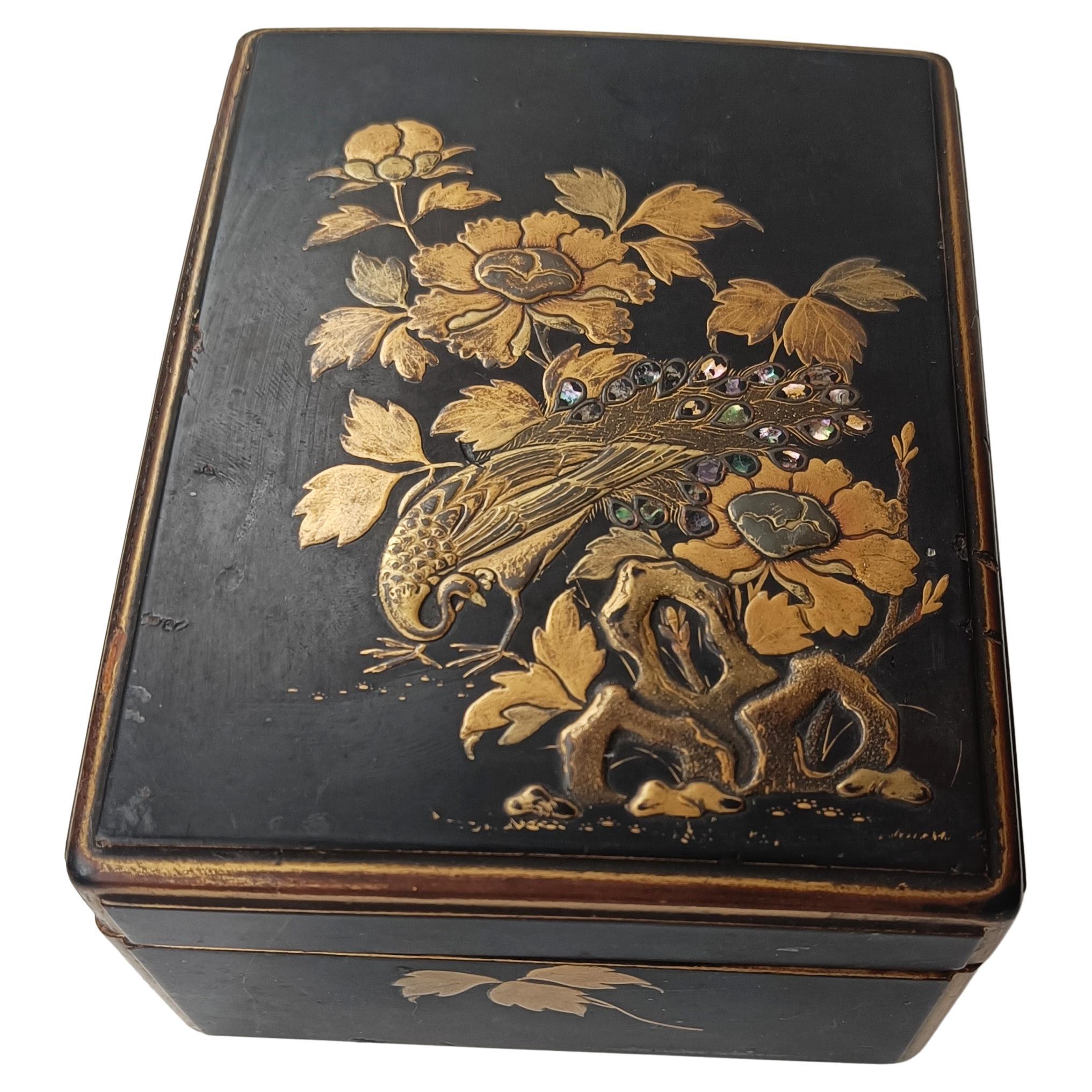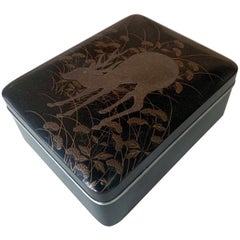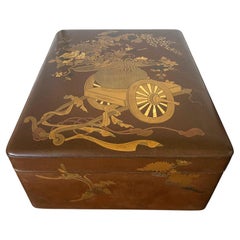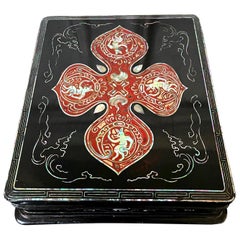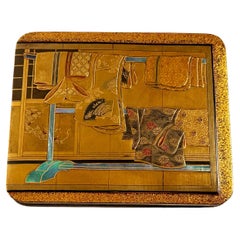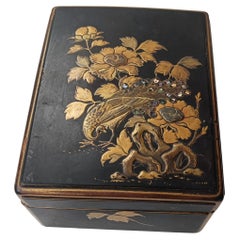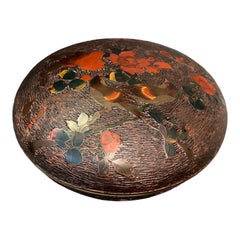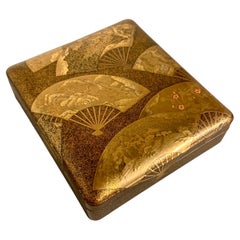Items Similar to Japanese Rinpa Style Lacquer Ink Stone Box Suzuribako
Want more images or videos?
Request additional images or videos from the seller
1 of 21
Japanese Rinpa Style Lacquer Ink Stone Box Suzuribako
$5,800
£4,397.20
€5,068.81
CA$8,168.37
A$9,058.12
CHF 4,759.37
MX$110,674.80
NOK 59,546.20
SEK 55,894.28
DKK 37,839.62
About the Item
A Japanese writing box with ink stone (known as Suzuribako) with exquisite maki-e decoration circa late Meiji to early Taisho period (1890s-1930s). The box features rounded exterior corner, an interior frame that holds ink stone and a silvered bronze water-dropper (Suiteki). Both the exterior and interior sides of the lid were beautifully decorated with Maki-e that depicts hanging guards on flowering vines, using high-relief gold takamaki-e contrasting with pewter and MOP shell inlay (Kanagai and Raden in Japanese respectively). The design is of classic Rinpa School, stylized, graphic and bold, focus more on the conceptual essence of beauty without overly concerning the minute details. The use of the gold, slightly burnished, inlaid pewter and shells, managed to create a harmonious and striking overall effect . The exterior is of a dense nashiji on a subdued brown background, in contrast with the interior of a black lacquer background with sparse sprinkles of gold powder, making it interesting visually when one opens the lid.
The suzuribako comes with a wood storage box that has wear and crack (appears original) and a purple wrapping silk panel (fukusa) with a family crest.
- Dimensions:Height: 1.5 in (3.81 cm)Width: 8.5 in (21.59 cm)Depth: 10 in (25.4 cm)
- Style:Japonisme (Of the Period)
- Materials and Techniques:
- Place of Origin:
- Period:
- Date of Manufacture:1900s-1930s
- Condition:Wear consistent with age and use. Minute edge nicks and small old impact marks on the right top and the gourd over the lid. One corner of the base has an stress crack with an old restoration. Scattered touchups. Contact wear on the base. Fukusa and box with wear and separation.
- Seller Location:Atlanta, GA
- Reference Number:1stDibs: LU945024716082
About the Seller
4.9
Platinum Seller
Premium sellers with a 4.7+ rating and 24-hour response times
Established in 2006
1stDibs seller since 2010
567 sales on 1stDibs
Typical response time: <1 hour
- ShippingRetrieving quote...Shipping from: Atlanta, GA
- Return Policy
Authenticity Guarantee
In the unlikely event there’s an issue with an item’s authenticity, contact us within 1 year for a full refund. DetailsMoney-Back Guarantee
If your item is not as described, is damaged in transit, or does not arrive, contact us within 7 days for a full refund. Details24-Hour Cancellation
You have a 24-hour grace period in which to reconsider your purchase, with no questions asked.Vetted Professional Sellers
Our world-class sellers must adhere to strict standards for service and quality, maintaining the integrity of our listings.Price-Match Guarantee
If you find that a seller listed the same item for a lower price elsewhere, we’ll match it.Trusted Global Delivery
Our best-in-class carrier network provides specialized shipping options worldwide, including custom delivery.More From This Seller
View AllJapanese Rinpa Style Lacquer Box Meiji Period
Located in Atlanta, GA
A black lacquer tebako (hand box) with maki-e decoration and silver trim, circa late 19th century, Meiji period. The surface of the lid features a Rinpa style maki-e paint depicting ...
Category
Antique 1890s Japanese Japonisme Lacquer
Materials
Wood, Lacquer
Antique Japanese Lacquer and Inlay Box from Ryukyu Island
Located in Atlanta, GA
A lacquer presentation box with mother-of-pearl inlays from Japanese Ryukyu Islands circa 17-18th century. The lidded box in rectangular form with rounded corner is a classic example...
Category
Antique 18th Century Japanese Japonisme Lacquer
Materials
Mother-of-Pearl, Lacquer
Japanese Lacquer Ryoshibako Document Box Meiji Period
Located in Atlanta, GA
A large Japanese lacquer box with elaborate Maki-e design from Meiji period, (mid-late 19th century). The generous size of the box was reser...
Category
Antique 19th Century Japanese Japonisme Lacquer
Materials
Wood, Lacquer
Unusual Japanese Lacquer Inkstone Box with MOP Inlays
Located in Atlanta, GA
A Japanese black lacquer box with mother of pearl inlays circa early 20th century, end of Meiji period. It was likely to be used to store inkstone or other scholarly items. The piece displays several interesting characteristics that appear puzzling initially. First, the form is not typical Japanese, but more Chinese and Korean, with its scalloped base. Second, the decoration of MOP inlays also suggests a Korean and Chinese affiliation, especially with the linear borders and the scrolling cloud patters on the sides of the box. These two observations suggest that the box may be from Ryukyu Island instead of Japanese mainland. Third, strikingly in the center of the cover, a bold quarterly floral pattern outlined with MOP was filled with a striking mottled red lacquer using tsugaru nuri...
Category
Early 20th Century Japanese Japonisme Lacquer
Materials
Wood, Lacquer
Japanese Lacquer Box with Fine Maki-e Decoration Meiji Period
Located in Atlanta, GA
A lacquered wood box with lid from Japan circa 19th century Meiji Period. The finely decorated box was used to store paper slips and small documents on the desk. It is overall finished with black lacquer (kuro) with sparse Mura-Nashiji effect outside and on the top surface of the lid, there are three Komainu, (sometimes known as Shishi or Japanese lions) frolicking and forming a circle in lively motion. Komainu are auspicious animals in Japanese cultures in both Shinto and Buddhism tradition. Originally from China, these animals symbolizes guardians to ward off evil spirits. Hiramaki-e was used in combination with carving and combing to render the lions with various surface textures. A gilt border with an slight angle was given to the lid and even the thin band is decorated with miniature floral scrolls. The interior of the box was finished in a dense nashiji. Underneath the lid, a cluster of peonies open lavishly by two gentle mounts. Takamaki-e (high relief) in both gold and silver were...
Category
Antique Late 19th Century Japanese Japonisme Lacquer
Materials
Wood, Lacquer
Antique Japanese Lacquered Incense Box Kobako in Kodaiji Style
Located in Atlanta, GA
An antique lacquered small box that was likely used to contain incense powder (it is called Kobako in Japanese), circa early to mid-19th century of the Edo...
Category
Antique 19th Century Japanese Edo Lacquer
Materials
Wood, Lacquer
You May Also Like
Japanese Tagasode (Whose Sleeves?) Lacquer Incense Box, Kobako, Meiji Period
Located in Austin, TX
A fine and unusual Japanese lacquer box for incense accessories, kobako, featuring a tagasode (whose sleeves?) design, Meiji Period, circa 1900, Japan.
The exquisite box of simple rectangular shape worked in maki-e lacquer, taka-maki-e, and raden, all against a lush ground of gold nashiji. Fitted with silver rims.
The main decorative element of the box depicts a six panel folding screen, byobu, showing an interior scene with kimono strewn over a rack, a motif known as tagasode (whose sleeves), all in raised taka-maki-e lacquer and inlaid raden.
The screen depicts an intimate room with tatami mats on the floor and sliding shoji doors in the background. The foreground depicts a large clothing...
Category
Antique Early 1900s Japanese Meiji Lacquer
Materials
Silver
Japanese Lacquered Wood Box 19th Century Asian Antiques 中国古董
Located in London, GB
Antique Japanese lacquered wood Box
Beautiful and elegant lacquered wood box and gold gilt, decorated with a crane with floral motives and Japanese script
Measures: Height 6 inches 1...
Category
Antique 19th Century Japanese Lacquer
Materials
Wood, Lacquer
Large Japanese Cloisonné Box and Cover, Japan, Meiji Period, 19th Century
Located in PARIS, FR
A rare Japanese bark tree large cloisonné box on metal from the Meiji period. Usually bark tree cloisonné was on porcelain (totai Shippo)
A very attracti...
Category
Antique Late 19th Century Japanese Metalwork
Materials
Metal
$2,500 Sale Price
25% Off
Japanese Maki-e Lacquer Document Box, Edo Period, early 19th Century, Japan
Located in Austin, TX
A spectacular Japanese maki-e lacquer lidded box, possibly a writing box, suzuribako, decorated with images of folding fans, ogi, Edo Period, earl...
Category
Antique Early 19th Century Japanese Edo Lacquer
Materials
Coral
Japanese Momoyama Period Black Lacquer and Mother of Pearl Box, 16th Century
Located in Austin, TX
A fine and unusual Japanese black lacquer and mother of pearl inlaid box, Momoyama Period, 16th century, Japan.
The large box and cover featu...
Category
Antique 16th Century Japanese Edo Lacquer
Materials
Lacquer, Abalone
Large Japanese Lacquer Document Box, Ryoshibako, Edo/Meiji period, Japan
Located in Austin, TX
A large and magnificently decorated Japanese lacquer document box, ryoshibako, signed Umeboshi/Baikyo, late Edo or early Meiji Period, mid 19th century, Japan.
The large document box, ryoshibako, of tall, rectangular shape with rounded corners, and fitted with an inrobuta (flush-fitting) cover with beveled edges. The exterior of this exquisite box is decorated all over with fifteen different raised reserves shaped as uchiwa (paddle) fans against a lush and intricate krikane ground imitating shagreen.
The uchiwa shaped reserves all of takamaki-e, and exquisitely painted with designs of animals, flowers, and landscapes in silver, gold, maki-e, hiramaki-e, and takamaki-e, with kirikane, nashiji, and polychrome embellishments, upon gold lacquer fudame grounds.
The interior of the lid is nothing short of spectacular, featuring a large design of a magnificent and beautifully detailed rooster and hen with chicks gathered around a lazy stream. Large stalks of chrysanthemum bloom behind them. All against an ethereal nashiji ground.
The cover of the box features five reserves:
1. Three minogame (turtles with long tails), symbolizing longevity
2. "Narihira Crossing the Sumida" from The Tales of Ise...
Category
Antique 1860s Japanese Meiji Lacquer
Materials
Softwood, Lacquer
More Ways To Browse
Japanese Stone
Japanese Stone Art
Lacquered Wood Panel
Japanese Lacquer Boxes
Japanese Lacquer Panels
Japanese Gold Lacquer Box
Japanese Shell Art
Antique Shell Inlay
Japanese Wood Inlay
Asian Black And Gold Decoration
Maki E
Silver Antique Japanese Boxes Silver Boxes
Box With Stones
Pewter Inlay
Antique Japanese Stone
Japanese Family Crest
Meiji Lacquer Box
Lacquer Writing Box
